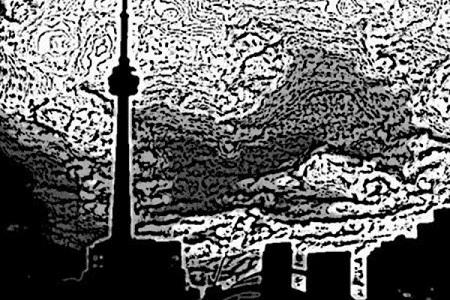
It has often been said that being marginalized is the same as simply being invisible. Your opinions matter for very little and, often, people don’t even realize you exist.
Inspired by interviews with Toronto’s homeless population, The Invisible City journals a mysterious epidemic where, all of the sudden, people just start vanishing into thin air. Currently playing at St. Vladimir’s Theatre, this Toronto Fringe show explores the theme of what it actually means to live on the periphery of mainstream society.
The acting in this production was superb. Daniel Bagg gave an emotive and relatable performance as a man who could still interact with the city’s ‘invisible’ population. For her part, Ashlyn Kusch was wonderfully fresh and exuberant as a spoiled teenager whose actions later lead her to personal torment. When she welled up on stage, I also felt her pain. And Christina Demunda was extremely believable as a psychiatrist struggling with the ethical dilemma of monetizing on the epidemic. But the standout star of the performance was Alyssa Bartlett. Her delivery was stellar and her movements on stage were crisp and elegant. The way she interacted with stage props and the chalkboard backdrop was riveting.
The Achilles heel in this production was, however, its unpolished and unfocused narrative structure.
Disappointingly, the press summary of this play was a little misleading. It stated that “the city is forced to change in order to survive.” Because of this, I was waiting throughout the entire performance for some sort of take-away or message on how we as a society could help those feeling marginalized. Sadly, the city never actually changed and there was no marvellous or unique insight given. All that was offered was an overly reductionist moral that, indeed, marginalized people do exist and that it would be nice if we paid them more attention.
“As long as we can see one another, there’s still some hope left.”
After the performance, I also asked other viewers what they thought. And for the five patrons that I had sampled, there was a general consensus that the story structure was a little “confusing” and “left [some audience members] with a lot of unanswered questions”.
Despite this, there were some great monologues peppered throughout the performance.
“Do you ever notice how there aren’t any milkmen anymore, or milk women? Come to think of it there are no milk children either. That’s what happens to people when you don’t need them. […] They disappear.”
If only the rest of the narrative could have been as insightful as some of these monologues.
For what it’s worth, if you’re looking for textbook-perfect examples of great acting and innovative stage choreography then The Invisible City is still worth adding to your Fringe schedule.
Details:
The Invisible City is playing at St. Vladimir’s Theatre (620 Spadina Ave.)
Show Length: 60 Minutes
Performances
- Wednesday, July 3 at 7:00 p.m.
- Saturday, July 6 at 8:00 p.m.
- Sunday, July 7 at 12:00 p.m.
- Monday, July 8 at 1:15 p.m.
- Thursday, July 11 at 11:00 p.m.
- Friday, July 12 at 11:30 p.m.
- Saturday, July 13 at 5:15 p.m.
Tickets
- Individual Fringe tickets are available at the door for $10 ($5 for FringeKids), cash only. Late comers will not be permitted.
- Advance tickets are $11 ($9 + $2 service charge) and are available online at fringetoronto.com, by phone at 416-966-1062 EXT 1, or in person during the festival at the Festival Box Office at 581 Bloor St W (located in the parking lot behind Honest Ed’s). Value packs are available if you plan to see at least 5 shows.
